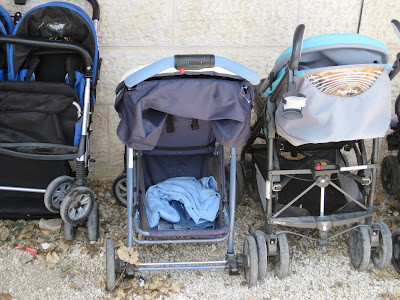Yom revi'i, 25 Iyar 5769.
When you prepare your file to make aliyah through Nefesh B'Nefesh, one of the requirements is to write an essay explaining why you want to make aliyah. Several recent blog posts made me feel like digging out our old essay, to see if it still rang true.
It does.
America is a terrific country; and we are blessed to live in a wonderful, warm Jewish community. We understand the language; and we know how the system works. So why would we want to leave, and make our home in Israel?
We want to live the Torah. That means participating in mitzvot that cannot be done in chutz l’Aretz. We want to live the shemitah year, rather than just read about it! We want to understand terumah and ma’aser, and receive the birkat Kohanim at the Kotel, with thousands of our fellow Jews. We want to stop practicing Judaism, and start living it.
In Israel, as holidays approach, cello bags of vegetables have recipes for the holidays on them. During shemitah, every discussion about food turns into a Torah discussion! Dried flowers replace fresh flowers as gifts, in order to respect the halacha. How beautiful is that?! People cry together, when Yom HaZikaron comes. (In America, we mourn at home, or in small groups, feeling very much on the sidelines, as if we don’t really deserve to participate.) And Yom Ha-Atzma’ut in Israel is filled with real pride and joy. We want to experience the Jewish holidays that we now can barely describe to our children.
In Israel, at Pesach, businessmen go to a lot of trouble to provide suits and food for Jews who cannot afford these commodities, without embarrassing the recipients. Beautiful Jewish girls read Tehillim on the bus. Jewish children discreetly give up their seats for the elderly at the bus stop, in a way that doesn’t highlight their elders’ infirmities. Young people work up their courage, and sit with people in their homes, recommending that they consider sending their children to learn Torah. And often the people let their hearts hear, and send their children to Torah schools! Many people’s lives are built around bettering the lives of others. Of course, this happens in America, within the Jewish communities. But in Israel, it is embedded in the national consciousness. In Israel, we are a family, helping each other. We want to be surrounded by our family.
In Israel, one learns to be humble about “judging the wine by the jug.” People can appear to be very secular; yet, they may say “Baruch Hashem” with as much kavanah as anyone in a shtreimel or a shaitel. Often, in Israel, we have met people with very deep faith, who don’t “dress the part.” We learn so much from every kind of Jew in Israel. We want to live in Israel full-time, and continue to learn from our brothers and sisters.
In Israel, when one packs clothing and presents and notes for soldiers, one feels he is part of the effort to protect the country. (In America, one only feels useless. The tiny amount of money we can donate is empty, compared to the work of our hands.) When one works in a soup kitchen, she feels she is giving back to her own zaydes and bubbies, instead of just “doing a nice thing.” (In America, the hungry in Israel feel too far away to help.) When one cleans rubble from a bombed-out seminary, or paints a wall, or even sweeps one’s own house, he feels as if he is doing a small part to help keep G-d’s house clean. You just can’t feel like that in the land of the free.
We want to come home, and bring our sons home, to add to our numbers, because we Jews belong in Israel; and because our enemies, and even many of our friends, don’t want our numbers to rise. And we want to be able to live in the country, rather than the city, and still have our sons marry Jewish girls! (No need to go into what happens in America, if one prefers a small town or country life.)
We want the terrible homesickness to go away, that has been torturing our people for millenia. We have been out here in the wilderness for far too long. Hashem took us out of Mitzrayim to be His servants in His Land. Time to go Home.
Baltimore, Maryland, Iyar 5767.
Glossary:
Chutz l'Aretz: anywhere outside of Israel
Shemitah: the sabbatical year, during which Hashem commands us to allow the Land to lie fallow
Terumah and Ma'aser: laws of tithing produce that I STILL don't properly understand
Birkat Kohanim at the Kotel: a very cool experience, wherein many priests bless many, many Jews at the Western Wall
Yom HaZikaron: Remembrance Day for the Fallen of Israel's Wars
Yom Ha-Atzma'ut: Israel's Independence Day
Shtreimel: elegant round fur hat worn by Chasidic men at holy and special occasions
Shaitel: wig [Yiddish]
Mitzrayim: Egypt





































